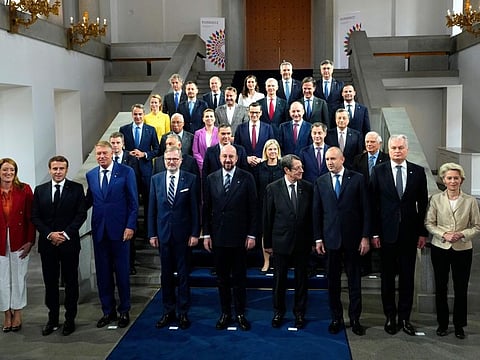EU leaders struggle to bridge gas price cap divide
Bloc prepares to contain crisis some fear could lead to blackouts, factory shutdowns

PRAGUE: European Union leaders struggled Friday to bridge significant differences over a natural gas price cap as winter approaches and Russia’s war in Ukraine fuels a major energy crisis, driving up prices for consumers and businesses.
The price cap is one of several measures the 27-nation bloc is preparing to contain an energy crisis in Europe that some fear could lead to rolling blackouts, factory shutdowns and a deep recession over the winter in economies already weakened by the coronavirus pandemic.
Russia has reduced or cut off natural gas supplies to 13 EU member nations as European governments bolster their support for Ukraine in the form of weapons, money, aid and sanctions on Moscow. The potential for shortages has led to surging gas and electricity prices that could climb higher as demand peaks during the cold months.
Standing in the way of an agreement was the simple fact that each member country depends on different energy sources and suppliers, and they’re struggling to see eye-to-eye on the best way ahead.
Latvian Prime Minister Krisjanis Karins summed up the challenge for the EU as it considers a possible gas-price ceiling.
“A price cap on gas, if that could be achieved, would be grand — with the caveat that we cannot endanger security of supply,’’ Karins said. “So we cannot set the price so that no one would sell gas into Europe.’’
Belgian Prime Minister Alexander De Croo said he hoped the “last hurdles’’ to a price cap would be overcome at the meeting, but also that leader should agree on a joint path of action to send two important messages.
“One to the energy markets, to make it clear we no longer accept these prices, we will not continue to pay this market manipulation. Secondly, an important signal to our populations, to our companies, that we are going to tackle the problem at the root,’’ he said.
In a choreographed moment, French President Emmanuel Macron, Dutch Prime Minister Mark Rutte and German Chancellor Olaf Scholz entered Prague Castle together on foot, walking past a small but noisy crowd of pro-Ukraine demonstrators.
Adavantage Germany?
A group of 15 member countries has urged the EU’s executive branch, the European Commission, to propose a cap on gas prices as soon as possible, but the idea has not secured unanimous support, with Germany notably blocking.
Scholz’s government is also annoying some of its fellow EU members. Polish Prime Minister Mateusz Morawiecki criticized Germany’s plan to spend up to 200 billion euros (dollars) to help keep gas prices low for its own consumers and businesses.
“The German plan undermines and destroys the common European market,’’ Morawiecki said, by giving German industry an advantage over those of its partners. Many, including France and Italy, think the move should have been coordinated with them or that EU money should be used instead.
For now, the European Commission says, Europe’s gas storage capacity stands at about 90%, even as Russian gas supplies to the EU declined by 37% between January and August, with the U.S. and Norway stepping in to provide liquefied natural gas. But those replacement supplies have not been cheap.
“I therefore recommend stepping up negotiations with our reliable suppliers to reduce the prices of imported gas of all kinds,’’ commission President Ursula von der Leyen said in a letter to the leaders ahead of Friday’s summit in the Czech capital.
Von der Leyen also recommended that countries work together to “develop an intervention to limit prices in the natural gas market,’’ where prices have fluctuated wildly over jitters about the war and potentially uncoordinated national responses to the problem.
As high gas prices drive up electricity prices, von der Leyen said, the EU should also work on a temporary cap on the price of gas that is used to generate electricity.



